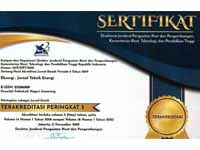Thermoelectric Conversion of Motorcycle Exhaust Heat into Alternative Electrical Energy: A Mini Review
DOI:
https://doi.org/10.32497/eksergi.v21i02.6845Keywords:
Thermal energy, hermoelectricity, thermoelectricity, alternative energy, motorcycle exhaust heatAbstract
Heat energy can be harnessed as an alternative source for electricity generation, including waste heat from motorcycle exhaust. Thermoelectric technology enables the direct conversion of this waste heat into electrical energy. This mini-review examines the utilization of motorcycle exhaust heat through thermoelectric systems. The findings indicate that exhaust temperatures can activate thermoelectric modules to produce electrical power, which can be used for applications such as motorcycle-mounted cell phone chargers. The generated electricity can also be stored in batteries to power lighting systems. Given Indonesia's high number of motorcycles, this technology shows strong potential for small-scale renewable energy generation, supporting advancements in sustainable energy solutions.
References
[1] A. Ammarullah, "Analisis Estimasi Kebutuhan Listrik Untuk Memenuhi Kebutuhan Smart Grid Di Jawa Barat Sampai Tahun 2032," EDUSAINTEK: Jurnal Pendidikan, Sains dan Teknologi, vol. 11, no. 3, 2024. doi: 10.47668/edusaintek.v11i3.1250
[2] T. A. Rizal, K. H. Lubis, and M. Amin, "Experimental Research on Utilization of Motorcycle Exhaust Heat Using Thermoelectric Generator (TEG) For Mobile Phone Chargers," Advances in Social Science, Education and Humanities Research, vol. 576, pp. 244 - 247, 2020.
[3] M. A. Fuadilah Habib, W. N. Kurrotaa'yun Nuriski, and R. Zamzami, "Be Kepo (Bioetanol Ketela Pohon) Inovasi Pemberdayaan Ekonomi Masyarakat dan Solusi Sumber Energi Alternatif Terbaharukan," Equilibrium: Jurnal Pendidikan, vol. 10, no. 1, pp. 110-123, 2022. doi: 10.26618/equilibrium.v10i1.6618
[4] A. A. Solikah and B. Bramastia, "Systematic Literature Review : Kajian Potensi dan Pemanfaatan Sumber Daya Energi Baru dan Terbarukan Di Indonesia," Jurnal Energi Baru dan Terbarukan, vol. 5, no. 1, pp. 27-43, 2024. doi: 10.14710/jebt.2024.21742
[5] P. Kumar, "Thermoelectric power generation by bike silencer," International Research Journal of Engineering and Technology (IRJET), vol. 7, no. 3, pp. 3990 - 3994, 2020.
[6] M. Kubenova et al., "Exhaust waste heat recovery system using thermoelectric generator: a prospective of novel simulation technique toward low-carbon technology," International Journal of Low-Carbon Technologies, vol. 20, 2025. doi: 10.1093/ijlct/ctae249
[7] S. Jumini, R. S. Iswari, and P. Marwoto, "Thermoelectric use in various renewable alternative energy source," Journal of Physics: Conference Series, vol. 1918, no. 2, 2021. doi: 10.1088/1742-6596/1918/2/022039
[8] F. Hidayanti, E. K. Wati, and M. F. Miftahudin, "Design of Energy Harvesters on Motorcycle Exhaust using Thermoelectric Generator for Power Supply Electronic Device," International Journal of Renewable Energy Research, no. v10i1, 2020. doi: 10.20508/ijrer.v10i1.10446.g7864
[9] C. S. Lai et al., "Case studies in contact burns caused by exhaust pipes of motorcycles," Burns, vol. 28, no. 4, pp. 370-3, Jun 2002. doi: 10.1016/s0305-4179(02)00016-5 Available: https://www.ncbi.nlm.nih.gov/pubmed/12052376
[10] D. Mohamad, H. Charis Fathul, L. Risk Fita, and N. Rezki, "Pemanfaatan Termoelektrik Sebagai Sumber Energi Terbarukan," Journal Zetroem, vol. 4, no. 1, pp. 23-25, 2022. doi: 10.36526/ztr.v4i1.1913
[11] H. Mamur, Ö. F. Dilmaç, J. Begum, and M. R. A. Bhuiyan, "Thermoelectric generators act as renewable energy sources," Cleaner Materials, vol. 2, 2021. doi: 10.1016/j.clema.2021.100030
[12] M. Masaji, M. Facta, and B. Winardi, "Pemanfaatan Thermoelectric Energy Generator (Teg) Sebagai Sumber Energi Listrik Menggunakan Buck Converter Dengan Umpan Balik Tegangan Berbasis Ic Tl494," Transient, vol. 7, no. 4, 2019. doi: 10.14710/transient.7.4.1106-1112
[13] R. Rizaldi and L. Edahwati, "Analisa Termoelektrik Generator Dan Motor DC + Kipas Dengan Perbedaan Alas Konduktor Dari Sumber Energi Panas," Jurnal Flywheel, vol. 13, no. 2, pp. 14-22, 2022. doi: 10.36040/flywheel.v13i2.5853
[14] C. Hudaya, "Rancangan Termoelektrik Generator (Teg) Portabel Pada Knalpot Sepeda Motor Dengan Material Alumunium Sebagai Konduktor," Jurnal TAMBORA, vol. 5, no. 1, pp. 60-65, 2021. doi: 10.36761/jt.v5i1.1001
[15] J. Almeida, P. Mendonça dos Santos, J. Caldinhas Vaz, R. A. Marques Lameirinhas, C. Pinho Correia Valério Bernardo, and J. P. N. Torres, "Step-Up DC-DC Converter Supplied by a Thermoelectric Generator for IoT Applications," Energies, vol. 17, no. 21, 2024. doi: 10.3390/en17215288
[16] R. Sukarno, "Pemanfaatan panas gas buang sepeda motor sebagai sumber energi alternatif menggunakan teknologi thermoelektrik," Jurnal Konversi Energi dan Manufaktur vol. 3, pp. 149 - 156, 2016.
[17] R. Rosalina, E. Roza, and H. Hadiansyah, "Perancangan Pembangkit Listrik Tenaga Panas pada Knalpot Motor," Prosiding Seminar Nasional Teknoka, vol. 3, 2018. doi: 10.22236/teknoka.v3i0.2827
[18] R. Saiful et al., "Optimizing Motorcycle Manufacturing Sustainability through the Integration of Waste Heat Recovery and Metal Scrap Recycling: A Process Engineering Approach," Leuser Journal of Environmental Studies, vol. 2, no. 2, pp. 75-85, 2024. doi: 10.60084/ljes.v2i2.225
[19] D. G. E. Setiawan, A. Arbie, and R. Kobandaha, "Pemanfaatan Panas Blok Mesin Dan Knalpot Sepeda Motor Sebagai Penghasil Sumber Energi Listrik Berbasis Termoelektrik Generator," Jurnal Fisika : Fisika Sains dan Aplikasinya, vol. 8, no. 2, pp. 65-72, 2023. doi: 10.35508/fisa.v8i2.13406
[20] Wardoyo, "Studi Karakteristik Pembangkit Listrik Thermoelektrik Melalui Pemanfaatan Panas Knalpot Sepeda Motor Sport 150 cc," Jurnal Konversi Energi dan Manufaktur, vol. 3, no. 2, pp. 70-75, 2016. doi: 10.21009/jkem.3.2.3
[21] F. Albatati and A. Attar, "Analytical and Experimental Study of Thermoelectric Generator (TEG) System for Automotive Exhaust Waste Heat Recovery," Energies, vol. 14, no. 1, 2021. doi: 10.3390/en14010204
[22] H. N. Mohammed, M. S. Imran, and H. J. Kurji, "Energy and Exergy Analysis of Thermoelectric Generator Installed on Diesel Engine Exhaust Heat Recovery System," International Journal of Heat and Technology, vol. 42, no. 6, 2024. doi: 10.18280/ijht.420624
[23] C.-I. Wu, K.-W. Du, and Y.-H. Tu, "Enhanced Energy Harvesting from Thermoelectric Modules: Strategic Manipulation of Element Quantity and Geometry for Optimized Power Output," Energies, vol. 17, no. 21, 2024. doi: 10.3390/en17215453
[24] Z. Zainol, S. F. Toha, N. A. Kamisan, and W. M. S. W. Bukhari, "Design and Development of a Retrofit Electric Motorbike," International Journal of Recent Technology and Engineering (IJRTE), vol. 7, no. 6S, pp. 71 - 75, 2019.
[25] T. N. Tien, Q. K. Vu, and V. N. Duy, "Novel designs of thermoelectric generator for automotive waste heat recovery: A review," AIMS Energy, vol. 10, no. 4, pp. 922-942, 2022. doi: 10.3934/energy.2022042
[26] R. Quan, D. Liu, W. Li, Z. Feng, Y. Chang, and H. Wan, "The potential role of automotive thermoelectric generator to improve the fuel economy of vehicle," Energy Conversion and Management, vol. 308, 2024. doi: 10.1016/j.enconman.2024.118421
[27] A. Kherkhar, Y. Chiba, A. Tlemçani, and H. Mamur, "Thermal investigation of a thermoelectric cooler based on Arduino and PID control approach," Case Studies in Thermal Engineering, vol. 36, 2022. doi: 10.1016/j.csite.2022.102249
[28] E. Naibaho and T. Tamba, "Utilization of Produced Heat in Motorcycle Exhaust as a Mobile Battery Charger Using Thermoelectric Seebeck Generato," Journal of Technomaterial Physics vol. 3, no. 2, pp. 101- 108, 2021.
Downloads
Published
Issue
Section
License
Copyright (c) 2025 Ragil Tri Pranata, Nanda Satria Irawan, Alvian Rizky Santosa, Muhammad Althaf, Bintang Adinata, Lee Yang, Dianisa Khoirum Sandi

This work is licensed under a Creative Commons Attribution 4.0 International License.
Authors who publish with this journal agree to the following terms:Authors retain copyright and grant the journal right of first publication with the work simultaneously licensed under a Creative Commons Attribution License that allows others to share the work with an acknowledgement of the work's authorship and initial publication in this journal.
Authors are able to enter into separate, additional contractual arrangements for the non-exclusive distribution of the journal's published version of the work (e.g., post it to an institutional repository or publish it in a book), with an acknowledgement of its initial publication in this journal.
Authors are permitted and encouraged to post their work online (e.g., in institutional repositories or on their website) prior to and during the submission process, as it can lead to productive exchanges, as well as earlier and greater citation of published work (See The Effect of Open Access).






